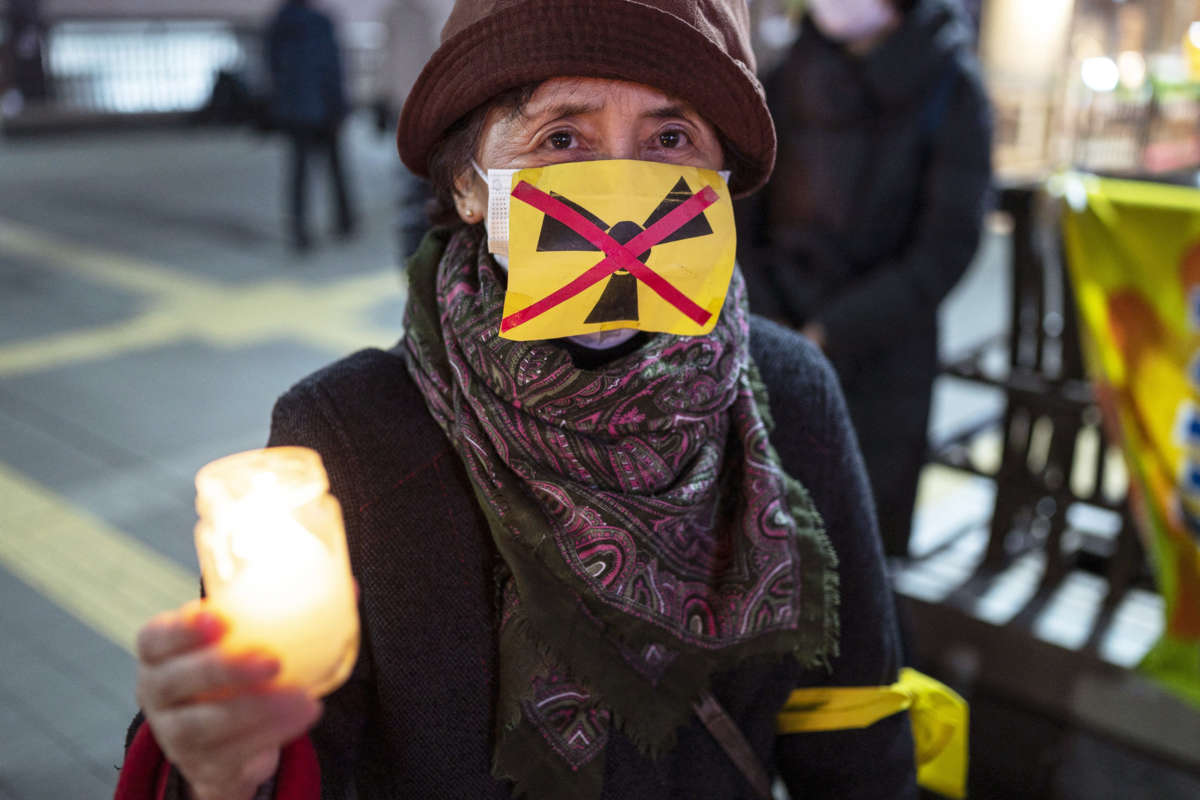Honest, paywall-free news is rare. Please support our boldly independent journalism with a donation of any size.
Despite outcry from local leaders and the Japanese public and warnings from environmental campaigners, Japan’s Nuclear Regulation Authority on Wednesday gave its approval for a plan to discharge contaminated water from Fukushima Daiichi nuclear power plant into the Pacific Ocean, a move critics say will pose a major threat to marine life.
After spending several months reviewing the plan announced by then-Prime Minister Yoshihide Suga’s administration last spring, the NRA said discharging more than 1.2 million tons of treated wastewater will help the Tokyo Electric Power Company (TEPCO) secure space needed to decommission the plant, where three reactors melted down in March 2011 after a tsunami.
Assuming the plan goes forward, the discharge is expected to begin in 2023, but critics including the governor of a neighboring prefecture are calling on TEPCO and the Japanese government to consider other options.
The plan “will extensively affect many industries in the prefecture, including fisheries, that are only now recovering from the earthquake damage,” said Gov. Yoshihiro Murai of Miyagi Prefecture last year after the central government proposed the discharge.
TEPCO will use an Advanced Liquid Processing System (ALPS) to treat wastewater that has been pumped in to Fukushima to cool fuel from the melted reactors and has mixed with rainwater and groundwater since the tsunami.
According to TEPCO, the water will be diluted to one-40th of the concentration permitted in Japan.
The system, however, is not able to remove tritium, a radioactive isotope of hydrogen, from the water. South Korean officials and fishing communities in the area have expressed concern that tritium will harm marine life in the Pacific.
TEPCO also acknowledged in 2018 that other isotopes including ruthenium, cobalt, strontium, and plutonium, “sometimes slip through the ALPS process,” according to Science.
“These radioactive isotopes behave differently than tritium in the ocean and are more readily incorporated into marine biota or seafloor sediments,” Ken Buesseler, a marine chemist at the Woods Hole Oceanographic Institution, told the magazine last year.
The Japan Fisheries Cooperatives told Prime Minister Fumio Kishida last month that its opposition to the water discharge plan, which it previously stated last year, “remains exactly the same.”
“We just hope people in the fisheries industry will be able to continue fishing with peace of mind,” Hiroshi Kishi, head of the cooperative, told Kyodo News.
Following the NRA’s endorsement, the discharge plan could be officially approved as early as July. The International Atomic Energy Agency will begin an inspection of the Fukushima plant Thursday, with South Korean officials participating in monitoring the plan.
A terrifying moment. We appeal for your support.
In the last weeks, we have witnessed an authoritarian assault on communities in Minnesota and across the nation.
The need for truthful, grassroots reporting is urgent at this cataclysmic historical moment. Yet, Trump-aligned billionaires and other allies have taken over many legacy media outlets — the culmination of a decades-long campaign to place control of the narrative into the hands of the political right.
We refuse to let Trump’s blatant propaganda machine go unchecked. Untethered to corporate ownership or advertisers, Truthout remains fearless in our reporting and our determination to use journalism as a tool for justice.
But we need your help just to fund our basic expenses. Over 80 percent of Truthout’s funding comes from small individual donations from our community of readers, and over a third of our total budget is supported by recurring monthly donors.
Truthout has launched a fundraiser to add 460 new monthly donors in the next 8 days. Whether you can make a small monthly donation or a larger one-time gift, Truthout only works with your support.
